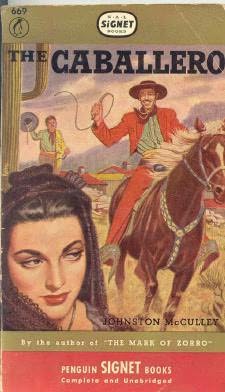Book Review: The Caballero by Johnston McCulley
Don Fernando Venagas is close to the top of the social pecking order in Spanish California, and he knows it. He is, after all, a wealthy caballero of the pure aristocratic blood, skilled with both horse and sword. As such, he thinks little of those below his status. But he is not a cruel man. Don Fernando would no more abuse a peon than he would a dog, and for the same reason–it would be beneath him. Besides, today Don Fernando is interested in romance, and in specific the lovely Senorita Manuela Moreno.

But Don Fernando is not the only fellow who has eyes for the lovely Manuela. Bartolo Rios also has set his cap for the senorita. Bartolo is rich, but his money comes from his father swindling small farmers of their land and cattle. Bartolo thinks cash on the barrelhead makes him just as good as any nobleman, but his heart is cold and his manners are atrocious. Bartolo whips peons for sport, and has no understanding of what women find attractive in a man.
When Senorita Moreno does the upper class woman equivalent of laughing in his face, Senor Rios decides that if the Venegas heir were dead, she would be more amenable to his suit. He forces a duel with Don Fernando, which is the last of his poor life choices. The local capitan rules it self-defense, but Bartolo’s even more evil brother Luis Rios vows vengeance.
Don Fernando meets with his friend and mentor, Fray Marcos. The good brother witnessed the entire affair and does not entirely agree with the military. Yes, it was self-defense, but Don Fernando was so much more skilled than his opponent that he could simply have disarmed Bartolo, but instead chose to go for the kill. That’s a sin, and Don Fernando must do penance. For three months he must abjure his status and power, and become a peon, living as the lowliest of society do. He is now just Fernando, a ragged peasant who must earn his living by the sweat of his brow. Only Fray Marcos, another peon named Pedro who is to act as Fernando’s guide to peon life, and (unknown to the others) Luis Rios know the truth.
This 1936 novel is by the same writer who brought us Zorro, and uses the same setting as those stories, but without a masked rider for justice. Instead, Fernando learns about the oppression inherent in the social system of Spanish California from the bottom. He soon makes new friends, though they sometimes laugh at his mannerisms and tendency to talk above his station.
Still, a combination of luck, Pedro’s wise guidance (for this peon is more than he seems) and having a goal in mind keeps Fernando from experiencing the worst consequences of his new status. Because of his better education, Fernando is able to spot that rabble-rouser Jose Tappia has no intention of being a good leader to the upcoming peasant uprising, but plans instead to line his own pockets.
Good: Johnston McCulley loved writing about Spanish California, and his passion comes through in the loving descriptions. The depiction of Native Americans is pretty good for the time the book was written (warning: period racism), and there’s some pretty frank critique of class oppression.
Not as good: There’s still some classism in the way the story works; the noveau riche Rios brothers cannot match the nobility of those born to the purple. And it’s made abundantly clear that native maid Singing Wind hasn’t got a chance with Fernando, as he’s going to wind up with the pure-Spanish Manuela.
Content warning: A known rapist is punched up a little bit while trying to abduct Singing Wind. Because he’s a known rapist, he’s only able to get his attackers sentenced to whipping instead of death, and he still gets to keep his military job.
Overall: Don Fernando becomes a better person because of his experience, and presumably will work to improve conditions for peons. That’s a good ending, and if you enjoy the hero succeeding, this is a good book for a light read. Might be hard to find, though.

